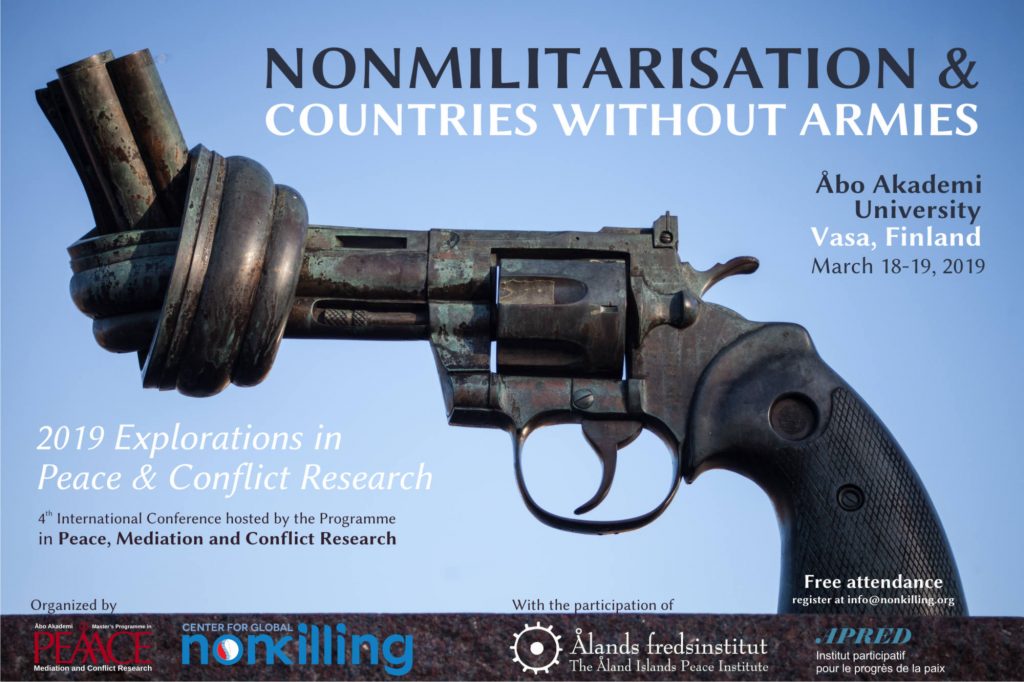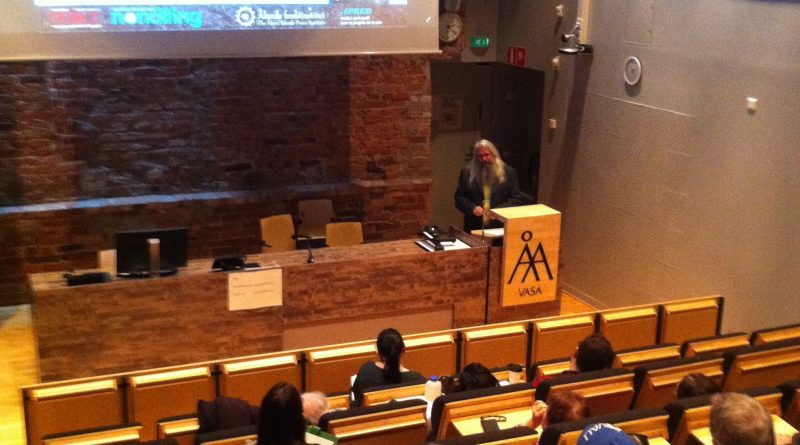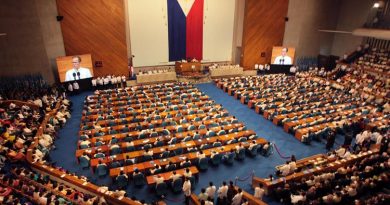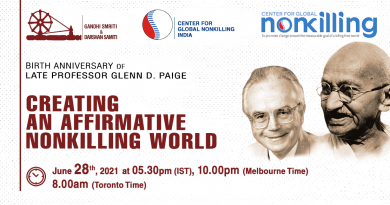Nonmilitarisation Conference Held in Finland
Some 50 participants attended the “Nonmilitarisation and Countries Without Armies” conference co-organized by the Center for Global Nonkilling and Åbo Akademi University’s Programme in Peace, Mediation and Conflict Research in Vasa, on March 18-19, 2019. The conference was organized with the collaboration of the Åland Islands Peace Institute (Ålands fredsinstitut) and the Swiss NGO APRED participative institute for the progress of peace and also featured speakers from the University for Peace (an international treaty body organization mandated by the UN and based in Costa Rica); Durban University of Technology, South Africa; University of Otago, Dunedin, New Zealand; University of Michigan, USA; and featured a closing address by Dr. Gene Keyes.
Christophe Barbey, UN Representative in Geneva for the Center for Global Nonkilling and coordinator of APRED introduced participants to “nonmilitarisation” as the status of a country that has no permanent or temporary national military institution, an existing situation in 26 independent countries.
Among the goals of the conference held in Vasa, the fourth of the “Explorations in Peace & Conflict Research” series, was to highlight the existence of nonmilitarisation and call for more research on the subject.
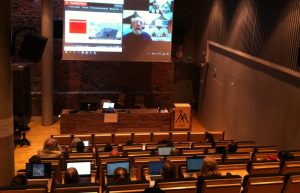
The absence of armies may be surprising in countries where they are deemed to be indispensable for national identity, social control, defense, and offense (Paige, 2002). However, as showcased in the gathering, the continuing existence of countries without armies and demilitarized territories throughout the world demonstrates the possibility of nonmilitary statehood: nonkilling nations are not unthinkable.
The topic of this conference followed up on the 2013 book Nonkilling Security and the State, developed by CGNKs Nonkilling Security Research Committee, creating an opportunity for further developing its discussions through new evidence and arguments offered by presenters from Costa Rica, Switzerland, Lesotho, South Africa, USA, Spain and the Åland Islands. Authors of the 2013 book participating included Christophe Barbey, Benjamin A. Peters and Gene Keyes.
A full report of the conference findings and discussions is being prepared by the graduate students of Åbo Akademi University’s Programme in Peace, Mediation and Conflict Research, and will be released shortly at CGNK’s website. The event was also featured by local media outlets, including a large in report in newspaper Vasabladet (available here in Swedish).
Participants
The event started out on March 18 with welcoming words by Prof. Kaj Björkqvist from Åbo Akademi and CGNK’s Director Joám Evans Pim. The opening address was given by the Dean of the University for Peace in Costa Rica Prof. Juan Carlos Sainz-Borgo. The address was pre-recorded and can be viewed online.
Christophe Barbey gave the opening lecture and set the floor with the main concepts, advantages and problems. He outlined the criteria used to identify the countries
having no army, gave examples on how they became army-less, highlighted their excellent
security record, gave a look at future issues could be and called for more research on various
effects of nonmilitarisation. Christophe is UN Representative in Geneva for the Center for Global Nonkilling and one of the founders of APRED participative institute for the progress of peace where he presently works as a coordinator and head of research. Christophe is specialist in peace policies and infrastructures and a leading expert on countries without armies, having published widely on the subject: Nonmilitarization: countries without armies. Identification criteria and first findings (Mariehamn, 2016); “Nonmilitarisation and Countries without Armies. A Necessary Step toward Nonkilling Security Institutions” (in Nonkilling Security and the State, Honolulu, 2013), etc. He also works on the place of peace in constitutions, including as an expert for the new constitution of the State of Geneva and on the links between peace and human rights: the human right to peace.
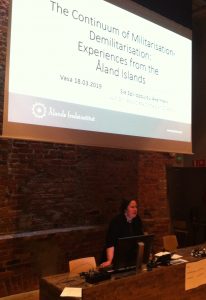 Christophe’s presentation was followed by the key-note lecture on “Demilitarisation as an international and regional tool: Experiences from the Åland Islands” offered by Sia Spiliopoulou Åkermark, Director and Head of Research of the Åland Islands Peace Institute (Ålands fredsinstitut) and Associate Professor at the University of Uppsala. Sia has recently co-authored the book Demilitarization and International Law in Context – The Åland Islands (Routledge, 2018) and previously published Justifications of Minority Protection in International Law (Uppsala & Dordrecht, 1997) and co-authored Towards Openly Multilingual Policies and Practices Assessing Minority Language Maintenance Across Europe (Multilingual Matters, 2016). She has served for many years as member of the Advisory Committee of Experts on the Framework Convention on National Minorities of the Council of Europe and was elected as its President in 2012-2014.
Christophe’s presentation was followed by the key-note lecture on “Demilitarisation as an international and regional tool: Experiences from the Åland Islands” offered by Sia Spiliopoulou Åkermark, Director and Head of Research of the Åland Islands Peace Institute (Ålands fredsinstitut) and Associate Professor at the University of Uppsala. Sia has recently co-authored the book Demilitarization and International Law in Context – The Åland Islands (Routledge, 2018) and previously published Justifications of Minority Protection in International Law (Uppsala & Dordrecht, 1997) and co-authored Towards Openly Multilingual Policies and Practices Assessing Minority Language Maintenance Across Europe (Multilingual Matters, 2016). She has served for many years as member of the Advisory Committee of Experts on the Framework Convention on National Minorities of the Council of Europe and was elected as its President in 2012-2014.
On March 19, CGNK Director Joám Evans Pim offered a lecture on “Taking Nonmilitarisation Seriously: The Alternatives of Civilian Based Defence”, exploring the possibilities for transition from current forms of military (in)security to alternative nonkilling common security arrangements based on civilian based defence.
The views presented by Evans Pim were supported from a very different theoretical approach by Piero P. Giorgi, who offered an anthropological and neuroscientific perspective on “Good News for Disarmament: The Nonviolent Nature of Human Beings” and how this provided grounds for confidence on the possibilities of nonmilitarisation. Piero is Associate Professor and Research Associate at the National Centre for Peace and Conflict Studies (NCPACS), University of Otago, Dunedin, New Zealand. Since 1967 he has worked in developmental biology and specialised in the development of brain and behaviour in vertebrates since 1970 and humans since 1990. Some of his findings can be read in the book The origins of violence by cultural evolution.
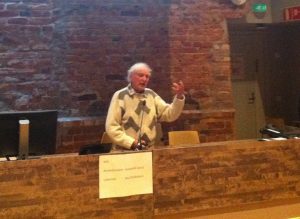 The afternoon session was continued with a lecture offered by Dr. Benjamin A. Peters on the topic “Securing the Right to Peace through Demilitarization: The Case of Costa Rica”. Benjamin A. Peters is Director of the Global Scholars Program at the University of Michigan and has previously served as Vice-Presidente and Dean of the School of International Liberal Arts at the Miyazaki International College, Japan. Recent publications by the author on the subject of this conference can be found in Peace Ethology: Behavioral Processes and Systems of Peace and Nonkilling Security and the State.
The afternoon session was continued with a lecture offered by Dr. Benjamin A. Peters on the topic “Securing the Right to Peace through Demilitarization: The Case of Costa Rica”. Benjamin A. Peters is Director of the Global Scholars Program at the University of Michigan and has previously served as Vice-Presidente and Dean of the School of International Liberal Arts at the Miyazaki International College, Japan. Recent publications by the author on the subject of this conference can be found in Peace Ethology: Behavioral Processes and Systems of Peace and Nonkilling Security and the State.
Technical problems prevented Geoff Harris, Durban University of Technology, South Africa, and Tlohang Letsie, National University of Lesotho, from offering a second case study on “Demilitarising Lesotho: rationale and financing”, but this was summarized by Christophe Barbey. Geoff Harris is head of the Peacebuilding Programme at the International Centre of Nonviolence, Durban University of Technology (South Africa). An economist by training, he has researched issues of military expenditure in developing countries and recovery from armed conflict for many years. His current research interests include the effects of economic inequality on inter-personal violence and the feasibility of demilitarisation for African countries. He is chair of the Board of Phoenix Zululand, which operates restorative justice programmes in the Zululand prisons, and of the trustees of the Alternatives to Violence (KZN) network. Dr. Tlohang Letsie is a Lecturer in Political Science at the National University of Lesotho who has advocated for the demilitarisation of the country.
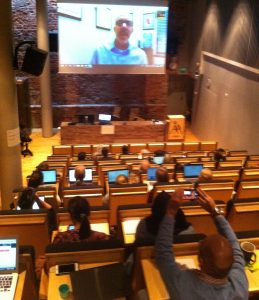
The closing lecture was given via Skype by Dr. Gene Keyes on “To Give Life: A Nonkilling Military: Precedents and Possibilities”. Gene is a long time peace activist, draft resister and advocate of nonviolent defence. Keyes’s 1978 Ph.D. thesis was Strategic Nonviolent Defense in Theory; Denmark in Practice. A condensed version appeared in The Journal of Strategic Studies as “Strategic Nonviolent Defense: the Construct of an Option”. In this work, he identifies morale as the center of gravity for a country nonviolently resisting an invasion by an enemy. The latest version of Keyes’s long-term interest in a nonviolent military was published as a chapter of the book Nonkilling Security and the State, where he elaborates ten kinds of missions for unarmed forces, including such obvious ones as Humanitarian Assistance / Disaster Relief (HA/DR), and hypothetical ones such as Defense in the spirit of Brazil’s great national hero, Major-General Cândido Mariano da Silva Rondon (1865-1958), who fostered the motto “Die if you must, but never kill”.
